- Home
- Mario Puzo
Last Don Page 6
Last Don Read online
Page 6
“I’ll be watching,” Pollard said. Now was the time he felt he should show some muscle. “Let me warn you, if you show up in Los Angeles again, I’ll have you arrested for extortion.”
Skannet’s red face brimmed with glee. “I’d love that,” he said. “I’ll be as famous as Athena.”
That night the surveillance team reported that Boz Skannet had left but only to move into the Beverly Hills Hotel, and that he had deposited the fifty-thousand-dollar check in an account he had at the Bank of America. This indicated a number of things to Pollard. That Skannet had influence, because he had gotten into the Beverly Hills Hotel, and that he didn’t give a shit about the deal he had made. Pollard reported this to Bobby Bantz and asked for instructions. Bantz told him to keep his mouth shut. The contract had been shown to Athena to reassure her and persuade her to go back to work. He did not tell Pollard she had laughed in their faces.
“You can stop the check,” Pollard said.
“No,” Bantz said, “he cashes it and we got him in court on fraud, extortion, whatever. I just don’t want Athena to know he’s still in town.”
“I’ll double the security on her,” Pollard said. “But if he’s crazy, if he really wants to harm her, that won’t help.”
“He’s a bluffer,” Bantz said. “He didn’t do it the first time, why would he do anything now?”
“I’ll tell you why,” Pollard said. “We burglarized his room. Guess what we found? A container of real acid.”
“Oh shit,” Bantz said. “Can you tell the cops? Jim Losey maybe.”
Pollard said, “Having acid is not a crime. Burglary is. Skannet can put me in jail.”
“You never told me anything,” Bantz said. “We never had this conversation. And forget what you know.”
“Sure, Mr. Bantz,” Pollard said. “I won’t even bill you for the information.”
“Thanks a lot,” Bantz said sarcastically. “Keep in touch.”
Claudia was briefed by Skippy Deere. And instructed as was proper to their roles as producer and writer on a picture.
“You have to absolutely kiss Athena’s ass,” Deere said. “You have to grovel, you have to cry, you have to have a nervous breakdown. You have to remind her of everything you’ve ever done for her as an intimate and true friend and as a fellow professional. You must get Athena back on the picture.”
Claudia was used to Skippy. “Why me?” she said coolly. “You’re the producer, Dita is the director, Bantz is president of LoddStone. You guys go kiss her ass. You’ve had more practice than me.”
“Because it was your project all the way,” Deere said. “You wrote the original screenplay on spec, you got me and you got Athena. If the project fails, your name will always be associated with that failure.”
When Deere left and she was alone in her office, Claudia knew Deere was right. In her desperation she thought of her brother, Cross. He was the only one who could help her, help make the problem of Boz disappear. She hated the thought of trading on her friendship with Athena, and knew Athena might refuse her but Cross never would. He never had.
She put in a call to the Xanadu Hotel in Vegas, but she was told that Cross would be in Quogue and would not be back until the next day. This brought back all the childhood memories she always tried to forget. She would never call her brother in Quogue. She never would voluntarily have anything to do with the Clericuzio again. She never wanted to remember her childhood again, never to think of her father or any of the Clericuzio.
BOOK II
The Clericuzio and
Pippi De Lena
CHAPTER 3
THE CLERICUZIO FAMILY legend of ferocity had been established more than a hundred years ago in Sicily. There the Clericuzio had waged a twenty-year war with a rival family over the ownership of a piece of forest. The patriarch of the opposing clan, Don Pietro Forlenza, was on his deathbed, having survived eighty-five years of strife only to suffer a stroke, which his doctor predicted would end his life within a week. A member of the Clericuzio penetrated the sick man’s bedchamber and stabbed him to death, shouting that the old man did not deserve a peaceful death.
Don Domenico Clericuzio often told this old story of murder to show how foolish were the old-fashioned ways, to point out that ferocity without selection was mere braggadocio. Ferocity was too precious a weapon to waste, it must always have an important purpose.
And indeed he had the proof, for it was ferocity that led the Clericuzio Family in Sicily to destruction. When Mussolini and his Fascists came to absolute power in Italy, they understood that the Mafia had to be destroyed. They did it by suspending due process of law and by using irresistible armed force. The Mafia was broken at the cost of thousands of innocent people going to jail or exile with them.
Only the Clericuzio clan had the courage to oppose Fascist decrees with force. They murdered the local Fascist prefect, they attacked Fascist garrisons. Most infuriating of all, when Mussolini gave a speech in Palermo they stole his prized bowler hat and umbrella imported from England. It was this peasant humor and contempt, which made a laughingstock of Mussolini in Sicily, that finally led to their ruin. There was a massive concentration of armed forces in their province. Five hundred members of the Clericuzio clan were killed outright. Another five hundred were exiled to the arid islands in the Mediterranean that served as penal colonies. Only the very heart of the Clericuzio survived, and the family shipped young Domenico Clericuzio to America. Where, proving that blood will tell, Don Domenico built his own empire, with far more cunning and foresight than his ancestors had shown in Sicily. But he always remembered that a lawless state was the great enemy. And so he loved America.
Early on he had been told the famous maxim of American justice, that it was better that a hundred guilty men go free than that one innocent man be punished. Struck almost dumb by the beauty of the concept, he became an ardent patriot. America was his country. He would never leave America.
Inspired by this, Don Domenico built the Clericuzio empire in America more solidly than the clan had in Sicily. He ensured his friendship to all political and judicial institutions with great gifts of cash. He did not rely on one or two streams of income but diversified in the finest tradition of American business enterprise. There was the construction industry, the garbage disposal industry, the different modes of transportation. But the great river of cash came from gambling, which was his love, in contrast to the income from drugs which, though most profitable, he distrusted. So in later years it was only in gambling that he allowed the Clericuzio Family to be involved operationally. The rest wetted the Clericuzio beak with a tithe of 5 percent.
After twenty-five years the Don’s plan and the dream was coming true. Gambling was now respectable and, more important, increasingly legal. There were the ever-burgeoning state lotteries, those swindles perpetrated by the government on its citizens. The prizes stretched over twenty years, which, in effect, amounted to the state never paying the money at all, just the interest on the money withheld. And then that was taxed in the bargain. What a joke. Don Domenico knew the details, because his Family owned one of the management companies that ran the lottery for several states at a very good fee.
But the Don was banking on the day when gambling on sports would become legal in all the United States as it was now legal only in Nevada. He knew this from the tithe he collected on illegal gambling. Profits on the Super Bowl football game alone, if gambling became legal, would come to a billion dollars, in just one day. The World Series with its seven games would yield equal profit. College football, hockey, basketball, all rich streams. Then there would be intricate, tantalizing lotteries on sports events, legal gold mines. The Don knew he would not live to see that glorious day, but what a world it would be for his children. The Clericuzio would be the equal of the Renaissance princes. They would become the patrons of art, advisors and leaders of government, respectable in history books. A trailing cloak of gold would brush out its origins. All his descendants, his followers, hi
s true friends, would be secure forever. Certainly the Don had the vision of a civilized society, the world, as this great tree shedding the fruit that must feed and shelter humanity. But in the roots of this great tree would be the immortal python of the Clericuzio, sucking nourishment from a source that could never fail.
If the Clericuzio Family was the Holy Church for the many Mafia empires scattered over the United States, then the head of the Family, Don Domenico Clericuzio, was the Pope, admired not only for his intelligence but for his strength.
Don Clericuzio was also revered for the strict moral code he enforced in his Family. Every man, woman, and child was completely responsible for his actions, no matter the stress, the remorse, or the hard circumstances. Actions defined a man; words were a fart in the wind. He disdained all social sciences, all psychology. He was a devout Catholic: payment for sins in this world, forgiveness in the next. Every debt had to be paid, and he was strict in his judgment in this world.
As in his loyalty. The creatures of his blood first; his God second (did he not have his own chapel in the house?); and third, his obligation to all the subjects in the domain of the Clericuzio Family.
As for the society, the government—patriot though he was—never entered the equation. Don Clericuzio had been born in Sicily, where society and the government were the enemy. His concept of free will was very clear. You could will yourself as a slave to earn your daily bread without dignity or hope, or you earned your bread as a man who commanded respect. Your Family was your society, your God was your punisher, and your followers protected you. To those on earth you owed a duty: that they would have bread to put in their mouths, respect from the world, and a shield from the punishment of other men.
The Don had not built his empire so that his children and his grandchildren would someday recede into a mass of helpless humanity. He built and kept building power so that the Family name and fortune would survive as long as the Church itself. What greater purpose could a man have in this world than to earn his daily bread, then in the next world to present himself to a forgiving deity? As for his fellow man and their faulty structures of society, they could all swim to the bottom of the ocean.
Don Domenico led his Family to the very heights of power. He did so with a Borgia-like cruelty and a Machiavellian subtleness, plus solid American business know-how. But above all with a patriarchal love for his followers. Virtue was rewarded. Injuries avenged. A livelihood guaranteed.
Finally, as the Don had planned, the Clericuzio reached such a height that it no longer took part in the usual operations of criminal activity except in the most dire circumstance. The other Mafia Families served chiefly as executive Barons, or Brugliones, who when in trouble went to the Clericuzio hat in hand. In Italian the words “Bruglione” and “baron” rhyme, however in the Italian dialect “Bruglione” means someone who fumbles the smallest tasks. It was Don Domenico’s wit, sparked by the Barons’ constant pleas for help, that changed the word “baron” to Bruglione. The Clericuzio made peace between them, sprang them from jail, hid their illegal gains in Europe, arranged foolproof ways for them to smuggle their drugs into America, used its influence with judges and different government regulators, both federal and state. Help with municipalities was usually not required. If a local Bruglione could not influence the city he lived in, he was not worth his salt.
The economic genius of Don Clericuzio’s oldest son, Giorgio, cemented the Family power. Like some divine laundress he washed the great spouts of black money that a modern civilization spews from its guts. It was Giorgio who always tried to moderate his father’s ferocity. Above all, Giorgio strove to keep the Clericuzio Family out of the glare of public notice. So the Family existed, even to the authorities, like some sort of UFO. There were random sightings, rumors, tales of horror and benignity. There were mentions in FBI and police department files, but there were no newspaper stories, not even in those publications that gloried in depicting the exploits of various other Mafia Families who, through carelessness and ego, came to misfortune.
Not that the Clericuzio Family was a toothless tiger. Giorgio’s two younger brothers, Vincent and Petie, though not as clever as Giorgio, had almost the Don’s ferocity. And they had a pool of enforcers who lived in an enclave of the Bronx that had always been Italian. This enclave of forty square blocks could have been used in a film of Old Italy. There were no bearded Hasidic Jews, blacks, Asians, or bohemian elements in the population, nor did any of these own a business establishment there. There was not one Chinese restaurant. The Clericuzio owned or controlled all real estate in the area. Of course some of the Italian families’ progeny sprouted long hair and were guitar-playing rebels, but these teenagers were shipped to relatives in California. Every year, new, carefully screened immigrants from Sicily arrived to repopulate. The Bronx Enclave, surrounded by areas with the highest crime rate in the world, was singularly free of evildoing.
Pippi De Lena had risen from Mayor of the Bronx Enclave to Bruglione of the Las Vegas area for the Clericuzio Family. But he remained directly under the rule of the Clericuzio, who still needed his special talent.
Pippi was the very essence of what was called Qualificato, that is, a Qualified Man. He had started early, making his “bones” at the age of seventeen, and what had made the deed even more impressive was he had done so with the garrote. For in America, young men in their callow pride disdained the rope. Also, he was very strong physically, of good height and with intimidating bulk. He was, of course, expert with firearms and explosives. All this aside, he was a charming man because of his zest for life; he had a geniality that put men at ease, and women appreciated his gallantry, which was half rustic Sicilian and half movie American. Though he took his work very seriously, he believed that life was to be enjoyed.
He did have his little weaknesses. He drank heartily, he gambled always, he was excessively fond of women. He was not as merciless as could be wished by the Don, perhaps because Pippi enjoyed too much the social company of other people. But all these weaknesses somehow made him more potent as a weapon. He was a man who used his vices to drain poison out of his body rather than to saturate it.
It helped his career, of course, that he was the nephew of the Don. He was of the blood, and that was important when Pippi broke the family tradition.
No man can live his life without making mistakes. Pippi De Lena, at the age of twenty-eight, married for love, and to compound that error he chose as a wife a completely inappropriate woman for a Qualified Man.
Her name was Nalene Jessup, and she danced in the show at the Las Vegas Xanadu Hotel. Pippi always proudly pointed out that she was not a showgirl who presented herself in the front line with her tits and ass showing, she was a dancer. Nalene was also an intellectual, by Vegas standards. She was bookish, took an interest in politics, and since her roots were in the particularly WASP culture of Sacramento, California, had old-fashioned values.
They were complete opposites. Pippi had no intellectual interests, he rarely read, listened to music, or attended movies or theater. Pippi had the face of a bull, Nalene the face of a flower. Pippi was extroverted, full of charm, yet he exuded danger. Nalene was so gentle in nature that not one of her fellow showgirls and dancers had ever been able to pick a fight with her, as they often did with each other to pass the time.
The only thing Pippi and Nalene had in common was dancing. For Pippi De Lena, the feared Clericuzio Hammer, was a veritable idiot savant when he stepped onto the ballroom floor. This was the poetry he could not read, the medieval gallantry of Holy Knights, the tenderness, the exquisite refinement of sex, the only time he reached out to something he could not understand.
For Nalene Jessup, it was a glimpse into his innermost soul. When they danced together for hours before making love, it made their sex ethereal, a true communication between kindred souls. He talked to her when they danced, alone in her apartment, or on the dance floors of the Vegas hotels.
He was a good storyteller with good stories t
o tell. He expressed his adoration of her in a flattering and witty way. He had an overwhelming masculine presence, which he laid at her feet as a slave, and he listened. He was proud and interested when she talked of books, the theater, the duties of democracy to lift up the down-trodden, the rights of blacks, the liberation of South Africa, the duty to feed the unfortunate poor of the Third World. Pippi was thrilled by these sentiments. They were exotic to him.
It helped that they suited each other sexually, that their opposites attracted each other. It was helpful to their love that Pippi saw the true Nalene but that Nalene did not see the real Pippi. What she saw was a man who adored her, who showered gifts upon her, who listened to her dreams.
They married a week after they met. Nalene was only eighteen, she knew no better. Pippi was twenty-eight and truly in love. He, too, was brought up with old-fashioned values, certainly from different poles, and they both wanted a family. Nalene was already an orphan, and Pippi was reluctant to include the Clericuzio in his newfound rapture. Also, he knew they would not approve. Better to face them with the deed and work things out gradually. They were wed in a Vegas chapel.
But here was another lapse in judgment. Don Clericuzio approved that Pippi married. As he often said, “A man’s primary duty in life is to earn his own living,” but to what purpose if he did not have a wife and children? The Don took umbrage that he had not been consulted, that the wedding had not been celebrated as part of the Clericuzio Family. After all, Pippi had Clericuzio blood.
The Don peevishly commented, “They can dance to the bottom of the ocean together,” but nevertheless he sent lavish wedding presents. A huge Buick, the ownership of a collection agency that yielded the princely income for that time of one hundred thousand dollars a year; a promotion. Pippi De Lena would continue to serve the Clericuzio Family as one of its closely affiliated Brugliones in the West, but he was banished from the Bronx Enclave, for how could this alien wife live in harmony with the faithful. She was as foreign to them as the Muslims, the blacks, the Hasidim, and the Asians who were banned. So in essence, though Pippi remained the Cleri-cuzio Hammer, though he was a local Baron, he lost some influence in the palace in Quogue.

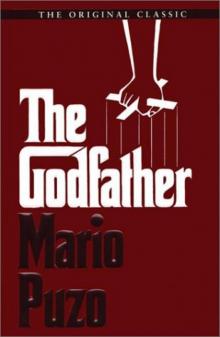 The Godfather
The Godfather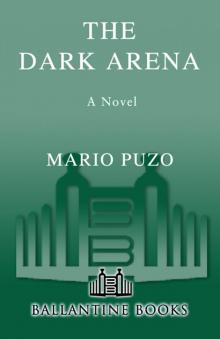 The Dark Arena
The Dark Arena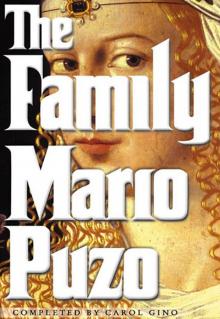 The Family
The Family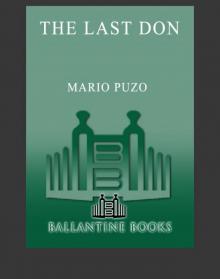 Last Don
Last Don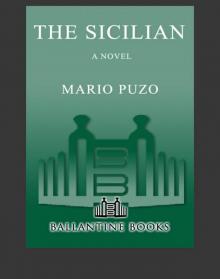 The Sicilian
The Sicilian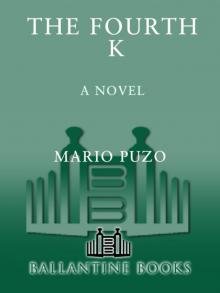 The Fourth K
The Fourth K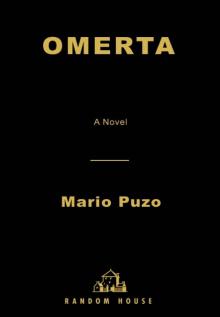 Omerta
Omerta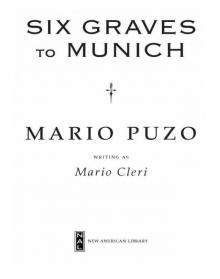 Six Graves to Munich
Six Graves to Munich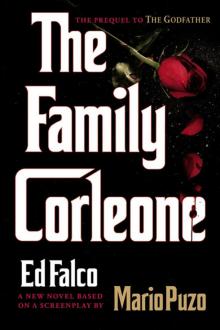 The Family Corleone
The Family Corleone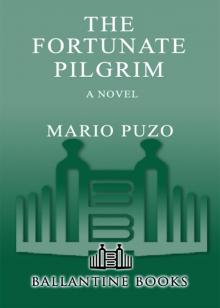 The Fortunate Pilgrim
The Fortunate Pilgrim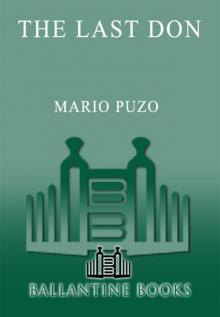 The Last Don
The Last Don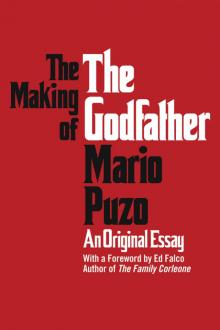 The Making of the Godfather
The Making of the Godfather Fools die
Fools die The Sicilian (v2.0)
The Sicilian (v2.0)